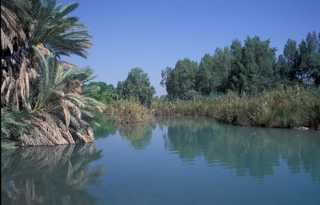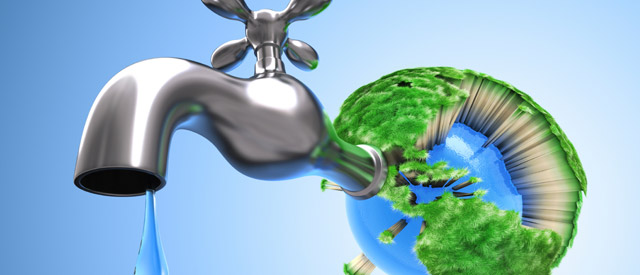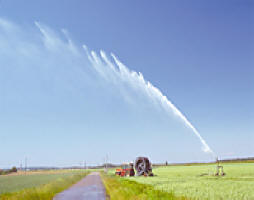 Main Conclusions - Minutes of the Meeting
Main Conclusions - Minutes of the Meeting
| Released | 10/04/2006 |
|---|
|
Main Conclusions - Minutes of the Meeting. |
|
EU Water Initiative Mediterranean Component Kick-Off Meeting Monday, 17 February 2003 Rue de Geneve 1, Salle Blue B-1140 Evere, Brussels Introduction The purpose of the informal Meeting was an exchange of views and information concerning the Mediterranean Component of the EUWI. The intention to launch a Mediterranean Component has been presented by President Prodi and the Minister of FA of Greece in Johannesburg. Following that, the Hellenic Government reconfirmed its intention and willingness to lead such a Component. The launching of this new Component has also been strongly supported by the EC. The first presentation of the Concept Note of the Med Component was done during the Meeting of the MSF of the EUWI on 3-4 December 2002. The Med Component shares the objectives of the EUWI and other Components and it aims at contributing to the implementation of the MDGs and the WSSD targets on water, sanitation and IWRM and water efficiency plans. The Med Component will build on and will be integrated in existing regional processes, aiming at providing a platform for strategic partnerships in the Region, being evolved through an open-ended and participatory process. The kick-off Meeting aimed at facilitating discussions among involved actors in the Med Region, for specifying the objectives and content of the Component and for finalising its Concept Paper, at formulating a Work Plan for the design phase of the Component, at starting an identification process of key building blocks in the Med Region as well as at collecting input for formulating the Working Group that will steer the process onwards. Some 35 participants (attachment 1: participants' list) from governments, EC DGs, intergovernmental organisations, regional networks, NGOs, local authorities etc attended the Meeting. The EU Water Initiative The Mediterranean Component of the EU Water Initiative Discussion Some of the key issues raised and discussed can be summed up as
follows: - Meeting water supply and demand in the Med is still a main challenge for the Region. In this context, opportunities from water recycling and desalinisation have to be examined on a cost -effective basis and water pricing policies in the Med have to be carefully assessed, taking into account social aspects, the need for water to be defined as a global public good as well as other political issues e.g. subsidising of water services. - Stakeholders and especially local stakeholders, professionals and the people in need, should be an integral part of shaping and promoting the Med Component. Stakeholders should be meaningfully engaged in the process from the beginning. Moreover, the process for involving Mediterranean Non-EU countries and accession countries in the Med Component procedures should be ensured. - There is need for defining in detail the geographic scope of the med Component, i.e. which countries should be involved, which should be the partner countries in the process, what should be the criteria for countries' involvement. Commission (DG RELEX, MEDA funds) suggested that Cion's clustering for Med countries according to the MEDA funds should be retained also for the Med Component, aiming at avoiding touching upon delicate political issues that might arise form an IWRM-shared waters approach. Others suggested that the main criterion should be the avoidance of overlaps with other Components (e.g. African Components). Others suggested that focus should be laid on technical aspects and where the real needs are, on a river basin/catchment/aquifer approach. Greece suggested that all countries of the Mediterranean should be included and that countries' identification is based on an investment approach, taking into account the existing sources of funding from the Commission (e.g. SMAP, MEDA and CARDS), M/S (ODA) and other donors (e.g. EIB). Such an approach would also entail coverage of all Balkan countries. - There is a great range of funding sources for the Med Region but there is lack of comprehensive data on financial flows to partner countries. One of the outcomes of the preparatory phase of the Med Component should be the compilation of an Inventory aiming at tracking financial flows from the EC and M/S (ODA). Coordination with the OECD's DAC for data collection and quality control as well as with other donors (e.g. WB) is also necessary. Identification of financial flows should not be limited to previous years. In this context, it would more important to assess commitments in the pipeline as well as the medium and long-term donor strategies and focus (geographic, thematic). - In order to compile an inventory of previous and future/channeled ODA flows, the DAC data sheets and inventories could be used as a basis. Practices used by the EUWI's Financial Component Group could also be employed (e.g. questionnaires to governments, donor focused workshops). Data from the Med Stat, EMWIS and the Global Assessment and Joint Monitoring Programme should also be considered. The organisation of sub-regional workshops aiming at an analysis of gaps with the participation of donors and recipients could assist the data collection exercise; workshops should aim at identifying donors' priorities which should be assessed and tested across recipient countries needs and priorities. Italy offered to assist this effort. There was a general consensus on the fact that any analysis and data collection should be done on a demand-driven approach laying emphasis on the identification of needs of partners. Many stressed that lack of detailed data on water (per sector and extended time series) is mainly due to the fact that water is not considered as an economic sector per se but pertains to other economic sectors. - EC (DG ENV) suggested that the Med Component should start small and focus on identifying hot-spot areas and problems, financial flows and ways to reformulate aid to meet real needs. The 2 main targets from the JPoI that have to be met are the preparation of IWRM and water efficiency plans by 2005 and the target on safe drinking water and sanitation by 2015. On the long-run, the Med Component should prepare a long-term strategy for meeting these targets until 2015. On the short-run and until 2005, some 2-3 demonstrations projects should be identified for river basins that the MEDA funds have not showed any specific results so far, and focus on implementing the IWRM approach on the ground level. - Bringing issues to the EU Council's Working Group on Development could also assist efforts for moving things forward and, in particular, the mapping exercise of financial flows and demands. - Commitment at the highest possible level from each involved country would be crucial for implementing the Component's objectives, especially during its preparatory phase. - Greece suggested that the identification of various building blocks
and stepping-stones within a river basin, the exploration of synergies
among them, the identification of gaps and the promotion of
complementary elements/activities to achieve IWRM, should be a key
objective for the design phase of the Component. Establishment of a Working Group for the development of the
Mediterranean Component - Terms of Reference Next Meetings and related events |
 you are not logged in
you are not logged in





